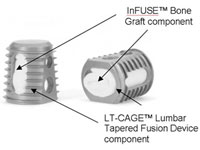
Physicians accused of withholding information linking Medtronic’s (NYSE:MDT) Infuse bone growth protein to increased cancer risk and other adverse events refused to disclose how much money they received from the med-tech titan over the 3-year period in which their studies were published.
The doctors penned a letter for Friday’s issue of the Spine Journal in response to concerns raised over their controversial research on Infuse between 2006 and 2009.
While the journal’s policy is to require full disclosure of potential conflicts of interest, the doctors refused to reveal how much money they received from Medtronic in that time-frame.
Three of the doctors alone are believed to have reaped more than $20 million, according to the Milwaukee Wisconsin Journal Sentinel.
The letter comes on the heels of a new study finding that the cancer risk from exposure to Infuse was even higher than previously reported.
Patients who underwent procedures using Infuse more than doubled their cancer risk within one year of use, according to Stanford University School of Medicine professor and Spine Journal editor of Dr. Eugene Carragee. The cancer risk grew to almost five-fold after three years, he said in an article published earlier this month.
"The surgeons who led Medtronic’s trials said there were no adverse events," president of the Assn. for Medical Ethics Dr. Charles Rosen said in regard to the findings. "They said what they needed to say to sell the product."
The controversy over the Infuse product, which includes allegations of marketing for off-label use against Medtronic, blew up over the summer when the Spine Journal dedicated its entire June issue (PDF) to exposing problems with growth proteins, including a repudiation of some of the research surrounding Infuse.
The journal’s investigation found that 13 studies (published by authors who collectively received millions from Medtronic) downplayed or omitted entirely evidence of safety risks from Infuse. The actual rate of "frequent and occasionally catastrophic complications" associated with the product was between "10 percent to 50 percent depending on approach."
The ensuing clamor spurred federal investigations into allegations that Medtronic’s paid consultants may have concealed Infuse’s risks.
"For several years Medtronic has been leading the industry in reforms designed to eliminate or mitigate conflicts of interest. We will continue to investigate questions surrounding researchers’ potential conflicts of interest, refine our policies as warranted, and strive to lead the industry in ethical and transparent business practices," Medtronic CEO Omar Ishrak said in a June statement.
In August Medtronic responded to the growing controversy by offering a $2.5 million grant to Yale researchers who will review Infuse’s safety profile.

